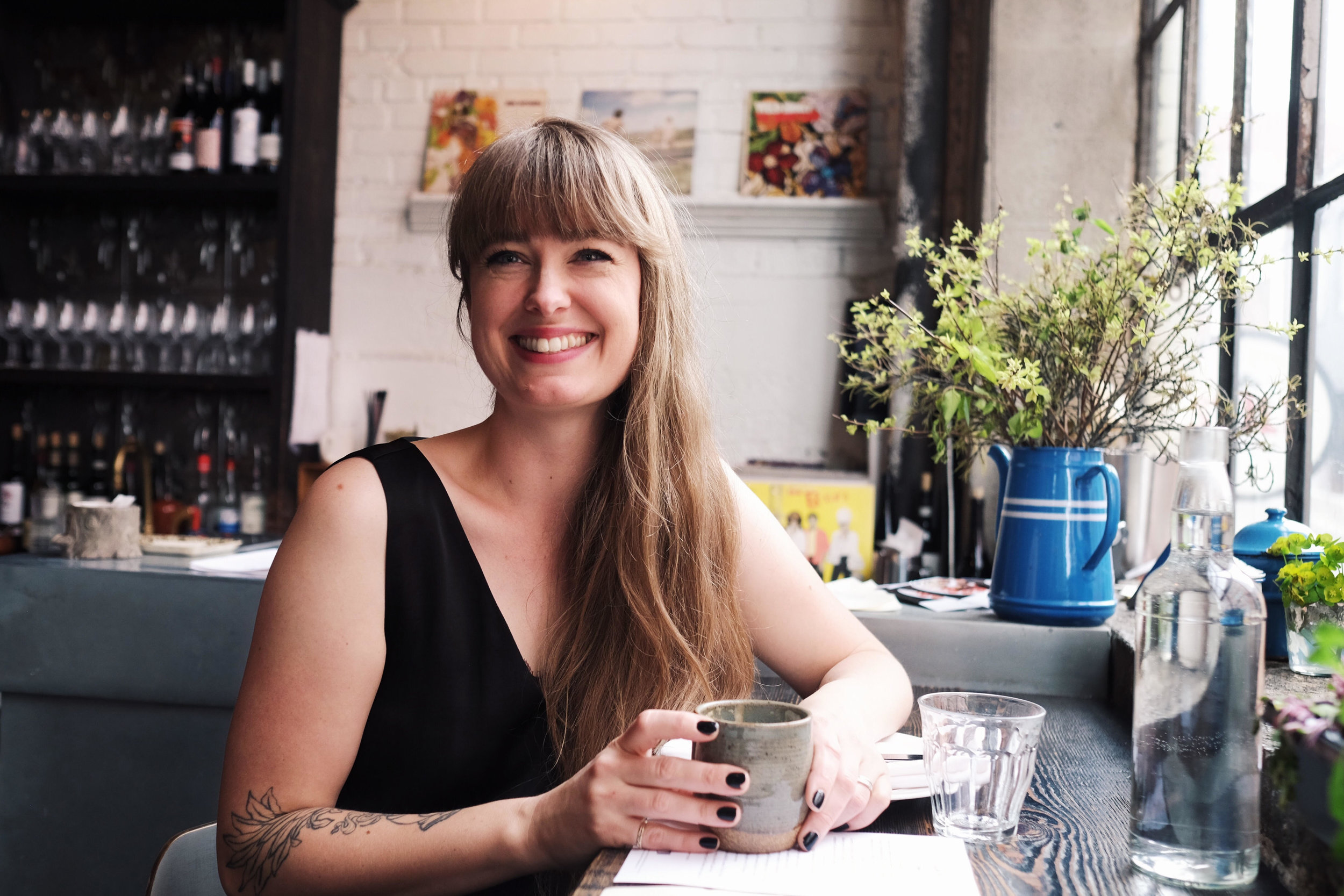The Creative Coffee Entrepreneur | Interview with Emily McIntyre

If you aspire to have a creative life in coffee there's no one better to look to than the bright eyed Emily McIntyre. If you follow the specialty scene you've undoubtedly read her work, seen her photographs, or perhaps even hired her to run your company's marketing campaign. Emily is creative to the core. Her words and photos are often rich with feeling and unafraid to tackle the bittersweet humanity that surrounds the beverage we all hold so dear.
Emily and I first met in sunny San Diego on a Caffeine Crawl. I was living in SoCal at the time and she had flown in from Kansas City to help host the event. It was outside of Dark Horse Coffee Roasters sipping on cold brew coffee and iced cascara that we connected. A few coffee events and trade shows later, Emily and I now have a running tradition of grabbing lunch during the Global Coffee Expo—to share stories over delicious food and coffee.
Last fall, Emily, her husband Michael, and their five year old daughter Eire spent spent four months living in Ethiopia. I caught up with Emily to hear more about her family's experience in Ethiopia, to find out about her involvement with Catalyst Coffee Consulting, and to learn about her recent role as the co-founder of a coffee tech-company called Crema.co. Today, I am grateful for the opportunity to share this Q & A with Emily along with some incredible photos from her time in Ethiopia—and, of course, a few I snapped at our annual lunch during Expo.
Photo of Emily McIntyre taken by her daughter, Eire.
tLBCC: What is your coffee origin story? How did you get your start in specialty coffee?
Emily McIntyre: Well... I bumbled into coffee, as I have into most of the best things in my life. I was a classical piano teacher in Missouri, and I desperately needed a change so I worked at a big ranch in the mountains of Colorado for a summer in a hamburger joint. My manager there had been a regional manager for Caribou coffee and told me I had a good personality for coffee. Believe it or not, that's all it took and when I returned to Kansas City I started banging on doors trying to get a coffee job. This was 2008. There weren't so many great shops in KC, and I ended up getting a job managing what had been the most progressive shop in the Midwest, Espresso dell'Anatra but was in serious decline by this point.
Then I met the red-bearded coffee demigod of Kansas City, Michael McIntyre, and fell—hard—for him at the same time I was falling in love with the awesome coffee community, and the beverage itself. Fast-forward a few years, I worked with Jason Burton at The LAB, organizing Caffeine Crawls on the West Coast and doing a bunch of beverage marketing work (Hey, that's how you and I met, right, in San Diego in 2014?) I'd been writing professionally for years and it turns out that's a valuable jumping-off place for a coffee career.
We moved to Portland mainly for the coffee culture, and in late 2014 opened Catalyst Coffee Consulting. I've worked with clients like Alliance for Coffee Excellence and many others, and consulted all over the world on various coffee value chain topics. Crema.co is my other coffee company, and it's based in San Francisco. We are a kick-ass marketplace with the best coffees in the country roasted to order and drop-shipped to customers.
I am romanced by coffee and by coffee people. I've interviewed hundreds of amazing, passionate, talented folks who have chosen to devote their lives to coffee on both sides of the industry, and the deeper I get into it the more excited I become about the way coffee brings us together with a common goal and vision. I am really lucky that my husband and I are on the same page about this, and we get to work together along with out 5 year-old daughter Eire (who is totally into coffee and coffee stuff).
Frankincense burning during an Ethiopian coffee ceremony or Buna. Addis Ababa. Photo by: Emily McIntyre
tLBCC: What compelled you and your family to spend four months in Ethiopia starting in November of 2016?
Emily McIntyre: At Catalyst, we've been working with Dominion Trading for a few years and Michael especially has spent a lot of time in Ethiopia sourcing coffees and working with growing communities like the Tiret Cooperative. In 2016 we also took on a consulting contract with a large exporter in Ethiopia that (through a sister company) owns or operates two washing stations in the Kochere and Gelana Abaya districts: Reko Koba and Semalo Pride. Since 2015 we had been planning to move to Ethiopia for the harvest/processing season to work with all these projects and do a solid job of oversight and training.
Reko Koba. Photo courtesy of Dean Falleti of Upper Left Roasters
tLBCC: Did you spend most of your time in a particular growing region? If so, is that region known for particular coffee varietals and/or flavor profiles?
Emily McIntyre: Well, one of the projects we spent quite a lot of time with is the Tiret cooperative, which is in the Arsi region of Harar, just over the mountain range from Sidama. When we first tasted this coffee a couple years ago it blew us away with its potential to recapture the lost "fabled Harar" flavor of dried blueberries and chocolate. We've had the privilege of working with Abebeyahu Negash (community leader) and the producers in a shared-risk/responsibility project and the results are really impressive so far with lots of potential too.
Zelalem Girma's Mother In Law, Ethiopian Chiristams.
Michael & Eire McIntyre Photo by: Emily McIntyre
tLBCC: What is the difference between drinking coffee in Ethiopia versus North America? Is there anything about Ethiopian coffee rituals that you would like to see more of in North America?
Emily McIntyre: Well I could go on and on about the Ethiopian buna ceremony but I'm just going to direct you to a blog post I wrote for Crema.co about it. One aspect of the Ethiopian coffee drinking style that I love is how relaxed and communal it is: there is no clock anywhere nearby, and there are usually three rounds for each ceremony. I think that spending time in Ethiopia has taught me a leisure I hope to retain here in the fast-paced culture. There's nothing more important to be doing that what, exactly, I am doing in this moment.
Emily & Eire McIntyre
tLBCC: For those of us who have never had the chance to visit a coffee growing region, are there any false perceptions or misconceptions about coffee origin that you would like to shatter?
Emily McIntyre: Oh wow, that's a huge topic. I think a big problem I see from consuming countries is the "missionary mentality". Never assume that coffee producers are helpless, or need us to save them. Nobody likes to be condescended to. We have no idea the challenges and triumphs they face on a daily basis: yes, there is a lot of need, but it can only be addressed in a way that honors both sides of the partnership. Dialogue, showing up for more than just photo ops, and mutual risk/reward: we need more of these things in the industry.
Eire McIntyre. Photo by Emily McIntyre
Michael and Emily McIntyre
tLBCC: What was it like bringing your 5 year old daughter along with you to Ethiopia?
Emily McIntyre: Wonderful, and challenging. Our cultures are very different; Michael and I are very private in our family life, particularly when it comes to parenting choices, while in Ethiopia there is a very neighborly perspective on childrearing. It's nothing for a stranger to punish a child, or delight with a gift. We had a lot of taut conversations with people who didn't understand that we needed to teach our daughter about life in our own way. At the same time, this very openness and sweetness with children coupled with Eire's wild extrovert nature made for some brilliant interactions when we least expected it. I loved seeing the world through her eyes: everything was astonishing, everyone was interesting.
Mill worker. Cheri Mill, Sidama, Ethiopia. Photo by: Emily McIntyre
tLBCC: On top of your work with Catalyst Coffee Consulting, you are the co-founder of Crema.co an U.S. based online coffee subscription. What are you most proud of about your work with Crema.co?
Emily McIntyre: I'm proud of the whole damn thing, but one piece of the puzzle I love is the quality and variety of roasters we are presenting to the world; and we add new ones every month and have light to dark, third wave to more traditional, and small to large. I'm also really proud of the design and storytelling of our site. We make a huge effort and put countless hours into researching and conveying the stories of the farmers and roasters we represent, and I think it shows in the sheer beauty of the experience.
tLBCC: What direction would you like to see the coffee industry head in?
Emily McIntyre: I want to see the passionate, hardworking professionals in every aspect of the coffee industry rewarded with a sustainable living and recognition.
tLBCC: If you had to give one piece of advice to a coffee company on how to market themselves better, what would it be and why?
Emily McIntyre: Learn from, don't mimic other companies. Analyze in detail your best competitors and inspiration, and apply what you learn to express the unique story and presentation of your company to the world. The worst thing you can do is be a shallow copy of another brand.
tLBCC: Do you have any words of wisdom to folks that are interested in following in your footsteps as a coffee journalist, marketer, photographer, and entrepreneur?
Emily McIntyre: I guess the main thing is the keep following your joy, and grab your courage in both hands to say NO to the things that don't bring you life. Sometimes it takes a while to responsibly leave a position or job, but you are never truly trapped while you have a drivers license, a credit card, and a roof over your head. Life is a work in progress: you really can figure out what you want to do, but know that it will keep changing and growing as you and your world expand. (That's a good thing...)
Harrar, Chancho Mt. Engule. Emily McIntyre & Eire with farmer Alme.
tLBCC: What inspires you?
Emily McIntyre: Wow, so many things and people. I'm inspired to tears by my friends in producing countries, by their courage and bravery in the face of huge challenges. I am inspired by my husband, Michael: we are so different and he constantly challenges me to go deeper, more raw, less bullshit. Life itself is both deeply painful and inexpressibly inspiring to me: that I wake up every morning, breathing and with the capacity for delight, is a gift beyond measure.
tLBCC: Where can we see more of your work?
Emily McIntyre: I write for a lot of coffee publications (just did a 9-part series on our Ethiopian trip for Fresh Cup) and regularly on both Crema.co and Catalyst blogs. Other publication clips are found on my website, though there are hundreds I haven't posted. I'm halfway through a fantasy novel which I expect to find a home for this year, so stay posted on that one!














